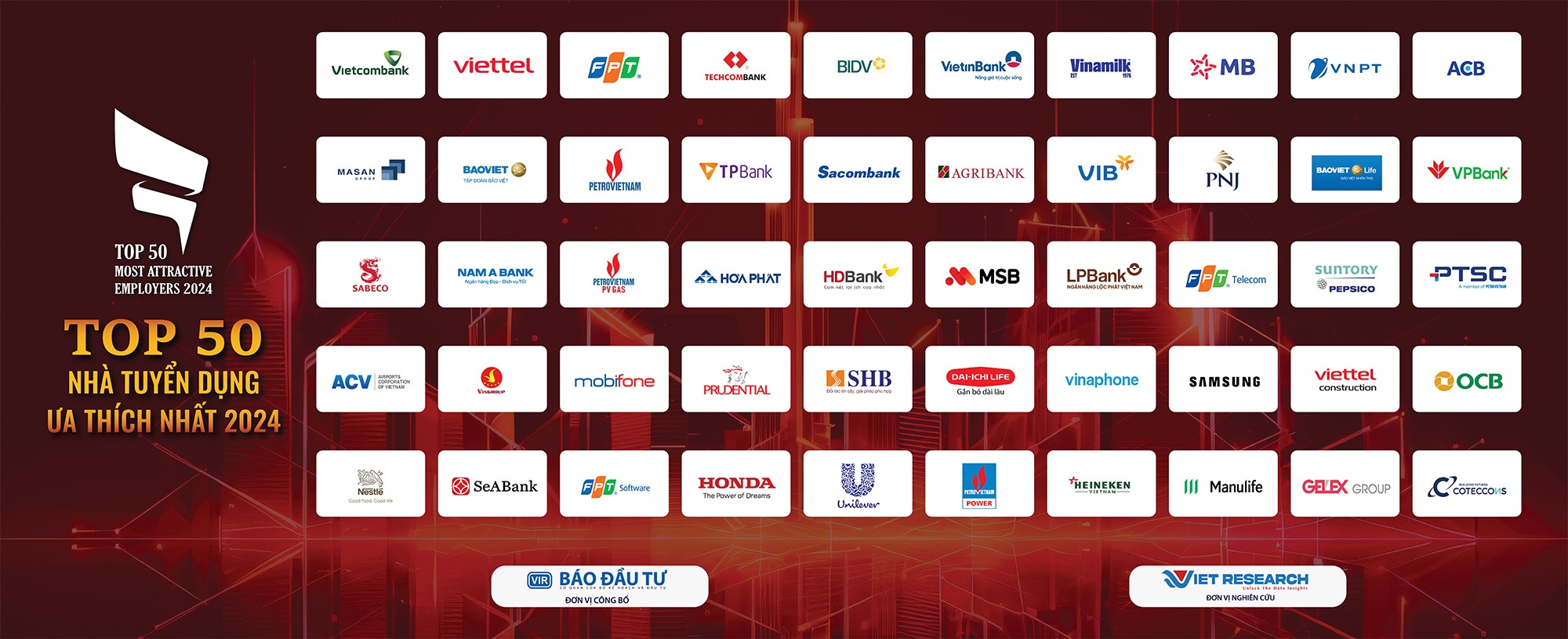Value-creating businesses can shape sustainable future
On December 12, Vietnam Investment Review, in collaboration with Viet Research, will host a ceremony to honour businesses that have made significant contributions to fostering professional, positive, and innovative work environments.
 |
These rankings not only validate the efforts of enterprises but also serve as evidence of their reputation and appeal to talents both domestically and internationally.
The awards cover the top 500 enterprises creating the most value in Vietnam (VALUE500), top 500 leading employers in the country, top 50 most attractive employers, top 10 workplaces in key economic sectors.
According to Viet Research’s survey results released ahead of the event, 65.5 per cent of businesses believe investing in brand image creates differentiation and attracts potential candidates.
“A strong brand not only reinforces a company’s position in the labour market but also helps retain employees by fostering a positive and sustainable workplace. Businesses increasingly recognise that integrating sustainability not only mitigates environmental impacts but also establishes a socially responsible and community-friendly corporate image,” the report highlighted.
 |
The report further notes that over 80 per cent of VALUE500 companies prioritise sustainable development through environmental protection initiatives and minimising the negative impact of business operations. Over the next three years, 75.9 per cent of enterprises anticipate that environmental and sustainability policies will significantly influence workplace practices.
“In a market economy, an enterprise’s core objective remains profit generation within a competitive landscape. However, sustainable development has become a prevailing trend today, where a company’s value is no longer measured solely by its highest profits or lowest costs,” said Vo Tri Thanh, director of the Institute for Brand and Competitiveness Strategy.
“Instead, businesses must align themselves with social responsibility, creating value for shareholders, employees, and society. These interconnected factors collectively contribute to a company’s comprehensive value,” Thanh added.
Citing Viet Research’s latest study on the VALUE500, he noted that these companies are evaluated based on criteria such as revenue, profit, tax contributions, employee benefits, and commitments to environmental, social, and governance (ESG) principles.
“This illustrates a clear relationship between social responsibility and business performance,” Thanh said. “Thus, the most crucial factor today is not only competition and profit but also the equitable distribution of benefits to employees and shareholders while delivering value to society and fostering sustainable development, what we often refer to as green growth.”
Thanh emphasised that beyond shifting perceptions, businesses must skilfully integrate their long-term vision and strategies with actionable steps toward transformation.
“This enables companies to generate economic value and creates social impact. For resource-constrained enterprises, the key principle is starting small, focusing on projects that yield profits and liquidity. This approach provides resources to invest in and advance more sustainable development efforts,” Thanh added.
Creating long-term value for shareholders, employees, and society requires leaders to navigate trade-offs and prioritise sustainable goals, leveraging these advantages to optimise resource allocation and financial potential, according to Prof. Tran Tho Dat, chairman of the Economics Professorship Council.
“Balancing profit maximisation with social responsibility involves rethinking traditional profit-maximisation approaches by incorporating ESG factors into financial considerations,” Dat said.
He advocated for a more comprehensive approach, transitioning from the conventional philosophy of business for profit to one of business harmonising stakeholder benefits. To achieve this, Dat suggested that businesses adopt strategies to define and align profit and social responsibility goals, ensuring these objectives complement and reinforce each other.
“Enterprises must embed sustainability principles into their business strategies, ensuring profit goals do not harm the environment or community,” he added. “Leadership must actively commit to and steer corporate social responsibility initiatives, invest in community programmes, create job opportunities, and support local development. Above all, transparency and accountability are crucial, with regular reporting on social and environmental impacts.”
For the first time in Vietnam, a national research programme on the VALUE500 has been conducted and published. It identifies and honours the cornerstone enterprises of Vietnam’s economy through comprehensive evaluations of various indicators for each company. These influential businesses are recognised not only for leading in revenue, profit, and budget contributions but also for pioneering sustainable development, innovation, job creation, and workforce development.
The research, assessment, and recognition of these companies serve as both a well-deserved acknowledgment of their efforts and a source of inspiration for other businesses to pursue long-term, sustainable growth while creating societal value, Viet Research said.
Being listed in the VALUE500 demonstrates that a company is not solely profit-driven but is also committed to generating long-term value for shareholders, customers, employees, and the community. This value encompasses both financial and non-financial aspects, such as customer satisfaction, employee welfare, social responsibility, and environmental protection. These qualities build a reputable and sustainable brand, earning trust and support from diverse stakeholders, it added.
What the stars mean:
★ Poor ★ ★ Promising ★★★ Good ★★★★ Very good ★★★★★ Exceptional
Related Contents
Latest News
More News
- A golden time to shine within ASEAN (February 19, 2026 | 20:22)
- Vietnam’s pivotal year for advancing sustainability (February 19, 2026 | 08:44)
- Strengthening the core role of industry and trade (February 19, 2026 | 08:35)
- Future orientations for healthcare improvements (February 19, 2026 | 08:29)
- Infrastructure orientations suitable for a new chapter (February 19, 2026 | 08:15)
- Innovation breakthroughs that can elevate the nation (February 19, 2026 | 08:08)
- ABB Robotics hosts SOMA Value Provider Conference in Vietnam (February 19, 2026 | 08:00)
- Entire financial sector steps firmly into a new spring (February 17, 2026 | 13:40)
- Digital security fundamental for better and faster decision-making (February 13, 2026 | 10:50)
- Aircraft makers urge out-the-box thinking (February 13, 2026 | 10:39)

 Tag:
Tag:


















 Mobile Version
Mobile Version